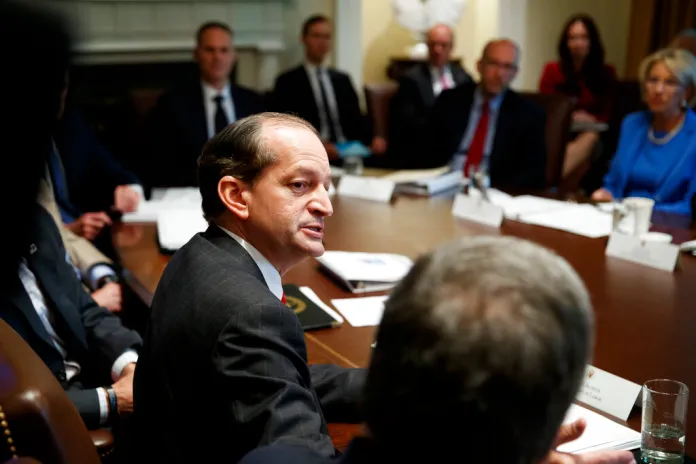Alex Acosta, the former federal prosecutor who orchestrated the controversial 2008 plea deal with Jeffrey Epstein, arrived for testimony Friday in a closed-door transcribed interview before the House Oversight Committee as lawmakers ramp up scrutiny of past failures in the long-running federal investigation.
Acosta, who later served as Labor Secretary under President Donald Trump during his first term, negotiated the non-prosecution agreement that allowed the financier and convicted sex offender to avoid federal charges in exchange for a guilty plea in Florida state court. Epstein, who pleaded guilty to state-related prostitution charges, including solicitation of a minor, served just 13 months in jail with extensive work-release privileges, a deal victims’ advocates and federal judges have since decried as excessively lenient.

“This Acosta deposition is a big deal, and I expect him to have a very challenging, probably six-hour deposition,” Rep. James Comer (R-KY), the Oversight chairman, said ahead of the interview. “It looks like Acosta had an opportunity to really hold Epstein accountable and for whatever reason, he failed to do that.”
Acosta arrived at Capitol Hill just before 9:30 a.m. ET on Friday and made his way to the closed-door room for what is likely to be hours of questioning. Acosta declined to respond to questions as he made his way to the interview room.
Shortly after Acosta’s arrival, Comer provided an update about the Trump administration’s cooperation with the investigation, saying that the committee was working with the Treasury Department to gain access to financial documents tied to the late and disgraced financier Epstein.
“We are going to go to Treasury and see the fully unredacted version … so let me say this, the Trump administration is fully cooperating,” Comer said, adding that he still believes this is a “bipartisan” investigation.
The transcribed interview with Acosta comes as the committee expands its investigation into how the Justice Department, under multiple administrations, handled the Epstein case. While Acosta resigned from the Trump administration in 2019 amid renewed scrutiny, his role as U.S. Attorney in Miami remains a focal point of ongoing inquiries.
FBI Director Kash Patel, during public congressional testimony earlier this week, blamed Acosta for what he called the “original sin” of the Epstein scandal. “I’m here to testify that the original sin in the Epstein case was the way it was initially brought by Mr. Acosta back in 2006,” Patel told senators.
The House Oversight Committee has subpoenaed numerous individuals and entities tied to the case, including former Attorney General Bill Barr, whose 120-page deposition transcript was released on Tuesday. Barr denied that Trump ever directed or discussed the Justice Department’s handling of its Epstein investigation and said he believed any criminal evidence against Trump or former President Bill Clinton, also a known associate of Epstein’s, would have leaked by now if it existed.
The panel has also obtained files from Epstein’s estate, including birthday letters and banking activity reports, and continues to seek full disclosure of DOJ case files. The Treasury Department is cooperating with the committee’s request for suspicious activity reports tied to Epstein’s financial network.
Acosta, for his part, has previously defended the 2008 deal, arguing it was the best way to secure any jail time given the risk that local prosecutors would have allowed Epstein to walk. But the DOJ’s internal watchdog concluded in 2020 that Acosta exercised “poor judgment” and agreed to “unusual and problematic terms.”
HOUSE OVERSIGHT EYES EXPANDING SUBPOENA LIST IN EPSTEIN INVESTIGATION
Victims and their attorneys have also objected to the fact that they were never consulted prior to the agreement. A federal appeals court panel later agreed the government should have notified them, even though it wasn’t legally required then.
The 2008 agreement remains central to Ghislaine Maxwell’s appeal of her 2021 conviction for sex trafficking. Maxwell argues the deal should have shielded her from prosecution as a coconspirator, a claim DOJ prosecutors have rejected.
